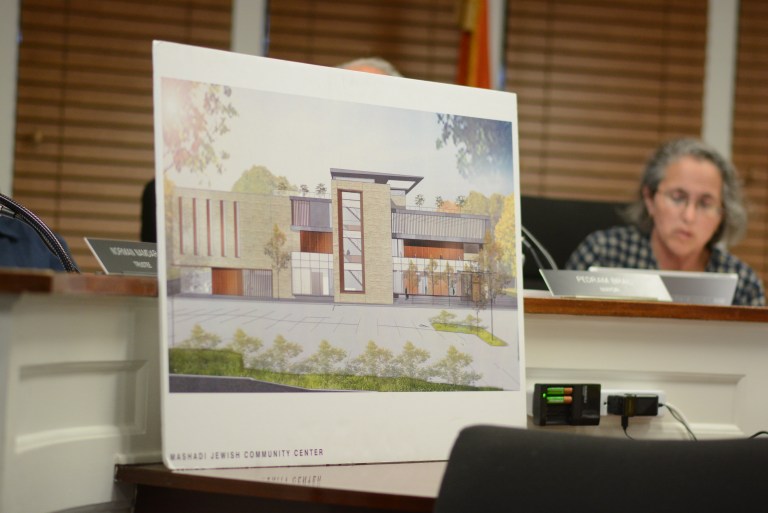
The Village of Great Neck Zoning Board of Appeals approved four variances for a Mashadi community center on Steamboat Road last Thursday night, after focusing on possible safety improvements for the project.
The United Mashadi Jewish Community of America’s proposed facility for 187-195 Steamboat Road in Great Neck would have more than 74,000 square feet of usable space, with gyms, an auditorium, pool, educational rooms and other features for exclusive use among its estimated 7,000 community members.
It would be operated in conjunction with two other facilities. The Young Mashadi Jewish Center is located at 130 Steamboat Road, while the Mashadi Jewish Center of Great Neck is located at 54 Steamboat Road.
While the Board of Trustees approved the site plan and conditional use permit for the three-story recreational facility and took on architectural review responsibilities at its July 2 meeting, it gave the zoning board responsibility for approving variances for height, floor area ratio, rear yard setback and parking requirements.
“Whereas this board appears to have been satisfied to grant the five variances [at its Dec. 6 meeting], we would ask this evening for the board to grant four variances, two of those for being items less of a variance than this board had considered previously,” Paul Bloom, an attorney for the applicant, said last Thursday.
The Iranian Jewish facility was scaled down after the Nassau County Planning Commission first recommended rejecting the proposal in December. The proposed building’s total usable floor area was shaved by more than 7,000 feet from 81,790 square feet, while its height dropped from 61.7 feet to 53.7 feet with there being one less floor.
The side yard was also changed from 16.6 feet to 20 feet, the minimum required under code, thus removing the need for a side yard variance.
Under village code, the maximum allowed height would be 30 feet, the building footprint cannot exceed 20 percent of the 86,249 square foot lot area, the maximum floor area ratio – or usable floor space – could not be more than 12,137 square feet, and the rear yard needed to be at least 79.7 feet rather than 32.9 feet.
The required number of parking spaces required under code would have been 200. Following the approval from the Board of Trustees, pending the submission of a shuttle bus plan, the developers will have 77 spots on the site – a 123 spot waiver.
Sarah Oral of Cameron Engineering, which prepared a traffic and parking study for the facility, previously said there are at least 106 spots between the two properties. Averaging four occupants per car, she had said there is enough parking for 732 people – well above the 526 maximum occupancy expected.
Bloom also said at a previous meeting that with the two other Mashadi-owned facilities on Steamboat Road and a shuttle service being planned, there is “more than sufficient parking.”
Bloom said they were pushing the building as far back as possible to “minimize the visual impact of the structure” and take advantage of the property’s downward slope away from Steamboat Road — hence the smaller rear yard.
“So there was a trade-off,” Bloom said. “We could have brought and met the rear yard setback, but that would have brought the building closer to the roadway.”
As for the parking waiver, Grossman said it was already approved by the Board of Trustees and out of their jurisdiction.
Zoning board member Ron Poons asked a series of questions focusing on the safety of the building, asking about the possibility of including more windows for exits, double doors, and fire escapes. He also said he found the proximity of educational rooms to a mechanical room and kitchen “distressing.”
Poons asked about whether there would be a generator on site in the event of a major power outage, given the estimated $18 million cost of the project, to which Bloom said there are battery backups but a generator hasn’t been fully considered yet.
Joe Yacobellis of Mojo Stumer Architects said there are several points of egress to get out of the building in each of the rooms, oversized corridors, and the building is compliant with fire codes, but the applicant is willing to explore various options to further improve safety.
“Our name is on this building forever,” Yacobellis said. “We want it to be safe.”
Len Baron, the building superintendent, also recommended the creation of a safety plan.
Allen Hakim, president of the United Mashadi Jewish Community of America, testified to the safety of the building, saying it will serve as a safe and healthy environment for people to come together and that he welcomes suggestions from everyone.
“I can assure you that safety has always, will always, be the priority of our community,” Hakim said.






